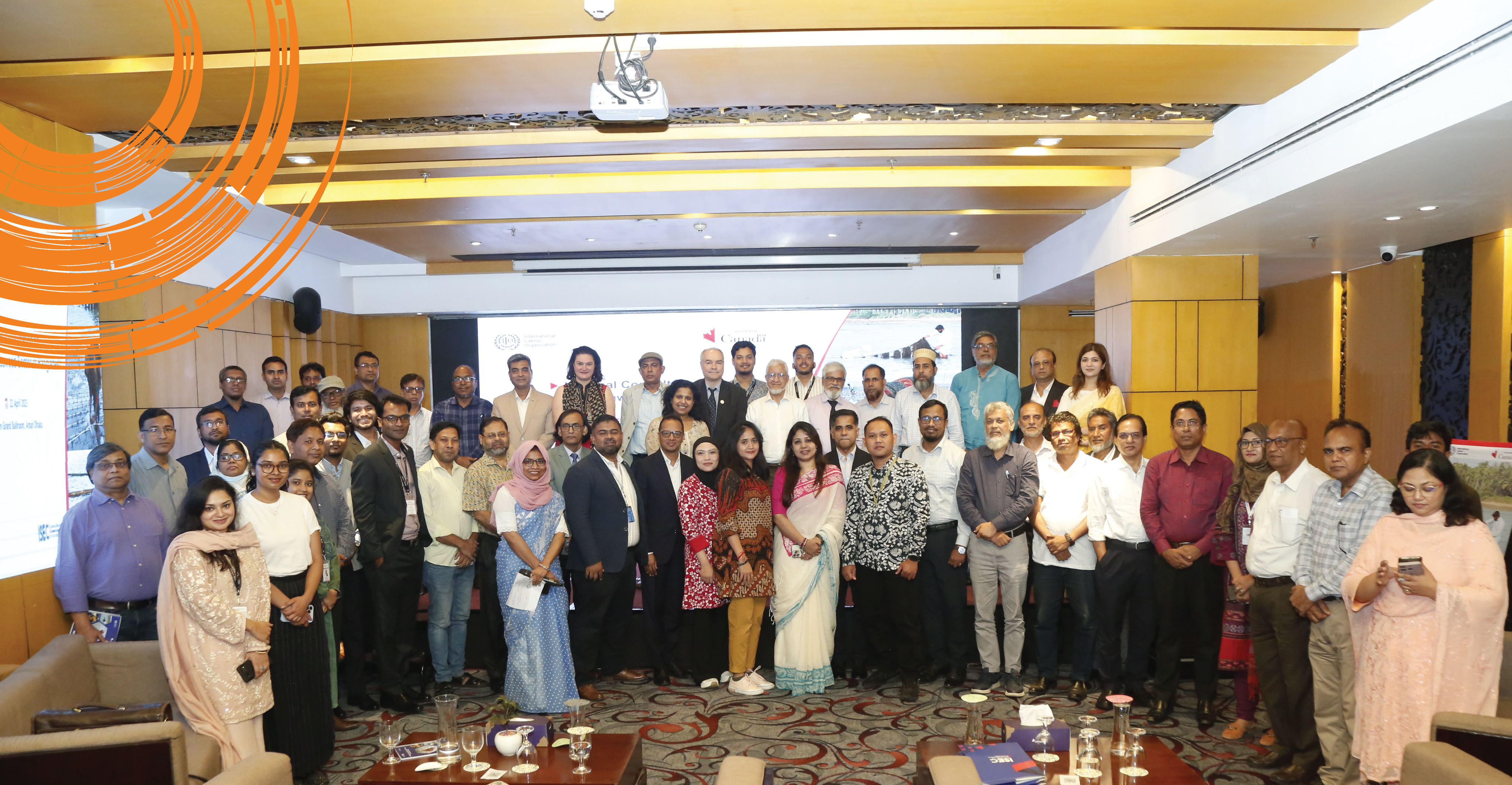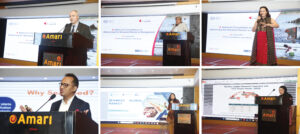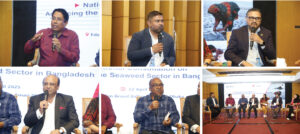
The National Consultation on Advancing the Seaweed Sector in Bangladesh was successfully held on April 22, 2025, at the Eden Grand Ballroom, Amari Dhaka. The event showcased the growing potential of seaweed as a sustainable livelihood and commercial sector for Bangladesh’s coastal communities. It marked a key milestone under the “Salt and Seaweed Market Systems Development” initiative, a component of The Leaving No One Behind: Improving Skills and Economic Opportunities for Women and Youth in Cox’s Bazar (ISEC) project.
The initiative is funded by Global Affairs Canada (GAC), implemented by Innovision Consulting Private Limited, and led by the International Labour Organization (ILO). The dissemination brought together a wide range of stakeholders, including representatives from government ministries, development partners, private sector actors, academia, and local community members, to review project achievements and discuss pathways for scaling the sector.
Chief Guest Mr. Md. Zakir Hossain, Additional Secretary, Ministry of Agriculture, commended the initiative for introducing innovation and inclusive practices in an emerging economic sector. He said, “”It’s great that BARI, BORI, BFRI, and the Department of Fisheries are already working on seaweed research. To move forward, we need a joint effort involving all key organizations. The current government is supportive of such work, and we believe this is the right time to act. We can bring everyone together at the Ministry, with the ILO taking the lead, to plan the next steps and make this initiative a success.”

Md. Rubaiyath Sarwar, Managing Director of Innovision and Team Leader of the project, presented the project’s achievements. He shared that the initiative trained 183 seaweed farmers across four newly introduced farming communities in Cox’s Bazar, with women representing 67% of the participants. Innovative farming methods, including floating rafts and long-line systems, were adopted. In the farming process, recycled plastic bottles were used as flotation devices, helping reduce production costs, mitigating theft risks, and promoting environmentally responsible practices.
Institutional collaboration under the project enabled critical research and market reach with partners such as the Bangladesh Agricultural Research Institute (BARI), TK Group, ACI Godrej Agrovet Private Limited, and ACI Fertilizer. BARI and the TK Group are exploring the conversion of shrimp hatcheries into seaweed nurseries and assessing the commercial viability of seaweed cultivation in saline ponds. ACI Godrej is testing the scope of integration of local seaweed into animal feed, while ACI Fertilizer is evaluating its application as bio-fertilizer. The Bangladesh Council of Scientific and Industrial Research (BCSIR) conducted nutritional profiling of seaweed, and 20 local entrepreneurs were trained to develop seaweed-based food products for wider consumer engagement.
The project emphasized decent work and climate resilience. Participants from Cox’s Bazar Sadar, Moheshkhali, Ukhiya, and Teknaf engaged in sessions on fair wages, safe working conditions, and business governance. Business management committees were formed in three farming clusters to manage shared facilities for drying, washing, and storage, improving work environments and operational efficiency. Additionally, 25 entrepreneurs, traders, and lead farmers received financial literacy training across seven farming zones.

To support academic advancement and innovation, the project facilitated collaboration between BARI and Chittagong Veterinary and Animal Sciences University (CVASU), promoting joint research, knowledge sharing, and technology transfer. Cross-border collaboration was strengthened through knowledge exchange between local government research institutes and Indonesian seaweed experts, promoting adaptation of global best practices in Bangladesh.
The panel discussion brought together key stakeholders and technical experts from the government, private sector, and international development agencies to explore the future of seaweed sector development in Bangladesh. All panel members agreed on the importance of developing the seaweed sector to its full potential. They emphasized the need for a clear regulatory roadmap, stronger engagement from the private sector, and a focused effort to tap into emerging export markets.
Dr. Mostak Ahmed, Senior Scientific Officer at BARI, underscored, “BARI has been actively engaged in the seaweed sector since 2016, with a focus on developing value-added products such as agar-agar. Our research includes species like Gracilaria and Ulva, and we’ve also collaborated with Indonesian experts to exchange knowledge and best practices.”
Dr. Maya Puspita, Former Executive Director, Indonesian Seaweed Association, stated, “Seaweed has strong global demand, with countries like Indonesia exporting 36 million pounds annually, demonstrating the potential of a well-developed value chain backed by government support. For Bangladesh to become a competitive player in this market, a coordinated effort is needed among farmers, producers, traders, researchers, and policymakers, all aligned with global trends and consumer needs. Bangladesh possesses many advantages: a long coastline, rich biodiversity, skilled labor, active research institutions, and motivated women farmers. However, seaweed farming is currently limited to six months a year. Extending the farming season through research and innovation is essential.
A strategic, year-round development plan, guided by a comprehensive analysis and built on strong public-private partnerships, can position Bangladesh as a key player in the growing global market for seaweed and health-focused, organic products. With the right investment in sustainable practices and production standards, the opportunity is within reach.”
Krishibid Bashir Ahmed, Business Director, ACI Fertilizer, mentioned, “ACI is committed to collaborating on pilot initiatives aimed at developing the domestic market for seaweed-based biofertilizers. Subject to successful trial outcomes, we intend to gradually reduce dependence on imported seaweed by promoting sustainable local production.”
Mr. Tuomo Poutiainen, Country Director, ILO Bangladesh, reinforced, “To unlock the full potential of the seaweed sector, we must enhance all aspects of production, post-harvest management, trading, and product development. Collaboration among government, private organizations, research institutes, universities, and NGOs are key. Seaweed offers significant investment opportunities and could become a major driver of economic growth. We need clear policies, guidelines, and strong partnerships between government and private entities to succeed. Let’s work together to create economically viable seaweed farming zones, empowering women and youth in coastal areas like Cox’s Bazar while fostering sustainable entrepreneurship.”
The dissemination event had active participation from key government bodies, including the Ministry of Fisheries and Livestock, Bangladesh Oceanographic Research Institute (BORI), and Bangladesh Fisheries Research Institute (BFRI). Academic participation came from Chittagong University, Bangladesh Agricultural University, Gazipur Agricultural University (GAU), and Chattogram Veterinary and Animal Sciences University (CVASU).
Private sector stakeholders from the food, feed, and fertilizer industries got insight into product development and investment opportunities. Community organizations, including the National Coordination Committee for Workers’ Education (NCCWE), Cox’s Bazar Chamber of Commerce and Industry (CBCCI), and FAO emphasized the importance of locally-led development and promised to collaborate.
The discussion concluded with consensus across the participants on the urgent need for policy alignment.
Please access the full presentation on the overview of the project and seaweed sector in Bangladesh:
Seaweed for a Resilient and Empowered Community: The experience of ILO ISEC Project
Please access the full presentation on Global and Bangladeshi Seaweed Market Overview: What’s Needed to Advance the Seaweed Sector in Bangladesh by Indonesian Experts: